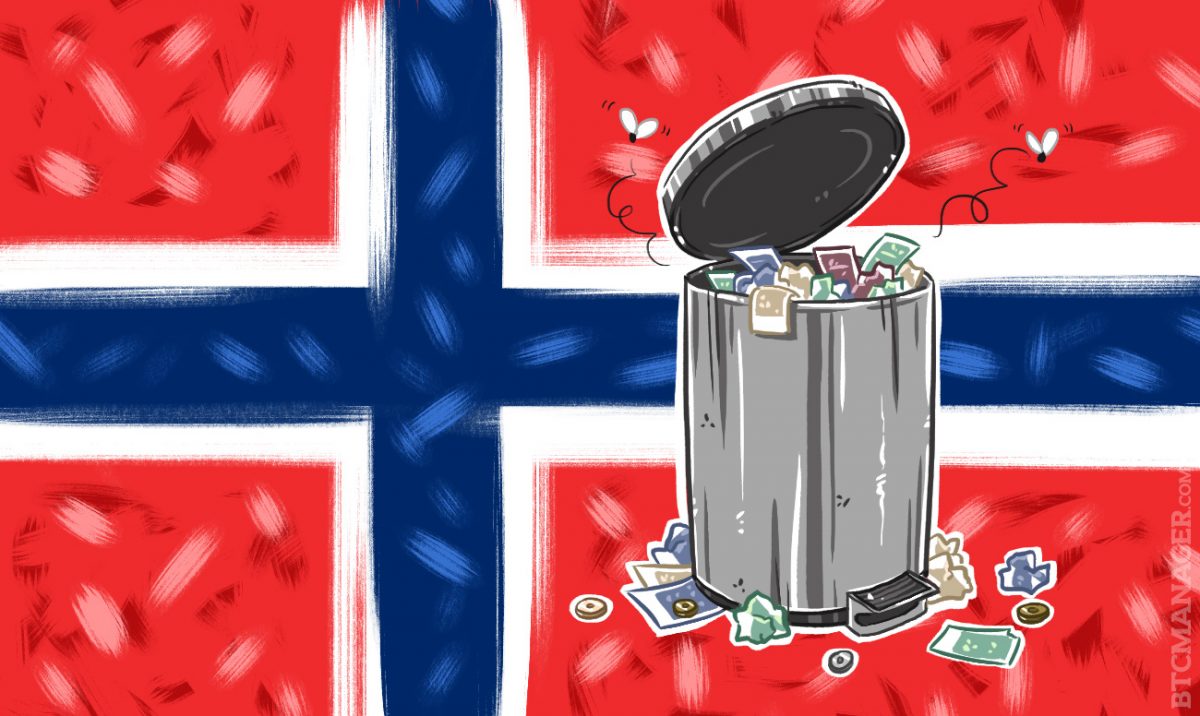Moving Toward a Cashless Society: Norway’s Two Largest Banks Abandon Cash

Norway’s largest bank, DNB, has suggested that the Ministry of Finance ban the circulation of cash, as a part of the nation’s major initiative to reduce black market sales and financial crimes like money laundering and fraud.
“Today, there is approximately 50 billion kroner in circulation and [the country’s central bank] Norges Bank can only account for 40 percent of its use. That means that 60 percent of money usage is outside of any control. We believe that is due to under-the-table money and laundering,” said DNB Executive Trond Bentestuen.
“There are so many dangers and disadvantages associated with cash, we have concluded that it should be phased out.”
Regardless of the claims of law enforcement and government agencies, the only form of money that is truly anonymous is fiat currency, simply because It is virtually impossible to track down the origin of cash if it is traded in the black market or illegal marketplace to purchase illicit goods such as drugs or weapons. Digital currencies like bitcoin however, can be traced with blockchain analytic tools, which allows anyone on the public network to track its origin and transaction details.
In essence, implementing a nationwide and government-controlled financial system allows law enforcement, the federal government and the central bank to surveil its people efficiently, recording every financial transaction and taxing them.
More importantly, commercial banks like DNB would prefer to have a purely digital currency system as it eliminates the possibility of a bank run, a situation in which a large number of bank or other financial institution’s customers demand their deposits in physical cash, usually in connection with concerns over the bank’s solvency.
Over the past two years, an increasing number of established financial institutions and industry organizations such as Finans Norge have begun to hint that the reality of a cashless society is in the works. Finans Norge stated in 2014 that the organization supports bringing an end to cash-based transactions in the country.
Bentestuen also emphasized that the demand for physical cash has substantially declined. Instead, the majority of these customers prefer to process their bank and transaction settlements in an online platform or application, which is much faster and more efficient.
“Eighty-five percent of our customers say that they never or only very rarely go to the bank. Therefore we think it is a mistake to maintain a very old structure with local branch offices. It is better to follow the customers and improve the offers where the customers are: digital,” Bentestuen said.
In essence, DNB is proposing a development of an encrypted national financial system in which the entire economy of Norway depends on the centralized financial network created and maintained by the government and commercial banks of the country.
However, DNB’s proposal has been heavily criticized by financial experts, due to privacy issues and the effect on tourists. Moreover, DNB has proposed a complete raid on cash without suggesting a viable alternate digital platform.
The Bank of England and its chief economist Andrew Haldane mentioned a similar financial system in September 2015, during his speech given at the Portadown Chamber of Commerce in Northern Ireland.
Haldane began his speech by mentioning the possibility of a government-backed electronic form of currency, which would preserve the social convention of a state-issued unit of account and medium of exchange. He further emphasized that cryptocurrencies could revolutionize the digital monetary systems of central banks currently in place.
“In one sense, there is nothing new about digital, state-issued money. Bank deposits at the central bank are precisely that. The technology underpinning digital or crypto-currencies has, however, changed rapidly over the past few years. And it has done so for one very simple reason: Bitcoin,” said Haldane.
“What I think is now reasonably clear is that the distributed payment technology embodied in Bitcoin has real potential. On the face of it, it solves a deep problem in monetary economics: how to establish trust – the essence of money – in a distributed network. Bitcoin’s “blockchain” technology appears to offer an imaginative solution to that distributed trust problem.”
Despite the criticism of financial experts and recommendations of global banks like the Bank of England, Norwegian banks have already begun to terminate the use of cash without having a proper digital currency system in place. DNB and Norway’s second largest bank, Nordea, have already stopped using cash in ther branch offices, following the lead of other European countries, including Denmark and Sweden.
Nordea, which already started to abandon cash in October 2015 claims that its customers have already adapted to cashless banks.
“We have only seen a marginal increase in transaction volumes in recent years. This is despite the fact that for almost a year Oslo Central has been the only branch of ours to offer this kind of service. Society is getting steadily more digital, and customers want to do as much as possible online or on mobiles. The whole of society is going in this direction. The other banks will follow – it’s just a matter of time,” said Nordea bank manager Ase Dahl.
It is still difficult to speculate the response from the central bank and federal government of Norway. If the country decides to abandon cash however, it may result financial chaos as it did in Sweden and Denmark.













